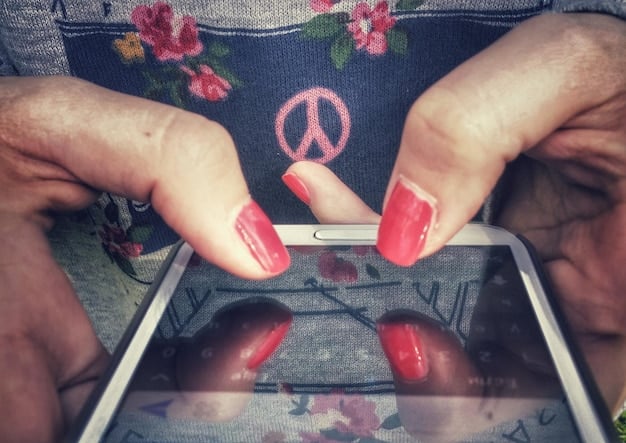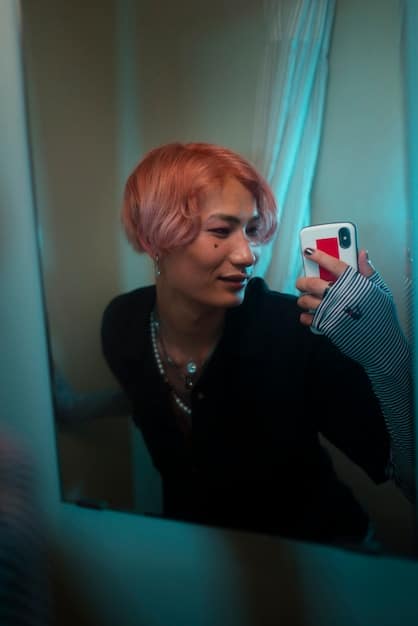Instagram’s Toxic Perfection: How It Hurts US Influencers’ Minds

The pressure to be perfect on Instagram significantly impacts the mental health of US influencers, fostering anxiety, depression, and a constant need for validation, driven by the platform’s curated culture of impossible standards.
The curated world of Instagram often hides a darker reality, especially for those who build their careers on the platform. The pressure to be perfect: How Instagram’s toxic culture is affecting US influencers’ mental health is a growing concern, impacting their peace of mind and overall well-being.
The Allure and Illusion of Instagram
Instagram, with its meticulously crafted images and highlight reels, presents an idealized version of reality. For US influencers, this platform is not just a social space, but also a professional arena where their livelihood depends on maintaining a flawless image. However, the very nature of this curated perfection can have detrimental effects.
The Pressure to Maintain a Flawless Image
The relentless pursuit of likes, comments, and followers can lead to immense stress and anxiety. Influencers often feel compelled to present an unattainable level of perfection, masking their flaws and insecurities to appeal to their audience. This constant performance can take a significant toll on their mental health.
The Impact of Filtered Realities
The use of filters, editing tools, and photo manipulation techniques is rampant on Instagram. While these tools can enhance images, they also contribute to a culture of unrealistic beauty standards. This creates a distorted perception of reality, leading influencers to feel inadequate and self-conscious about their natural appearance.
- Anxiety and Depression: The constant pressure to maintain a perfect image can lead to chronic anxiety and depression.
- Body Image Issues: Exposure to idealized bodies can trigger or exacerbate body image issues and eating disorders.
- Fear of Missing Out (FOMO): The curated nature of Instagram can create a fear of missing out, leading to feelings of inadequacy and social isolation.
The curated nature of Instagram, coupled with the pressure to maintain a flawless online persona, creates a breeding ground for mental health issues among US influencers. It’s essential to recognize the impact of this toxic culture and promote healthier online practices.

The Comparison Trap and Its Mental Toll
Instagram is a highly visual platform where users are constantly exposed to images of seemingly perfect lives. This can lead to a phenomenon known as “social comparison,” where individuals evaluate their own lives and accomplishments against those of others. For US influencers, who are constantly bombarded with images of their competitors, this comparison trap can be particularly damaging.
The Cycle of Validation and Insecurity
The pursuit of likes and comments is a form of external validation that can become addictive. Influencers may become overly reliant on these metrics to gauge their self-worth, leading to a cycle of insecurity and the constant need for approval. This can be especially harmful when negative or critical comments surface.
The Illusion of Authenticity
Many influencers strive to present an authentic image to their followers, but the reality is often far from genuine. The need to maintain a certain persona can lead to a disconnect between their online and offline selves. This lack of authenticity can contribute to feelings of guilt, anxiety, and a sense of not being true to oneself.
- Reduced Self-Esteem: Constant comparison to others can lead to a decline in self-esteem and a negative self-image.
- Increased Anxiety: Worrying about how one is perceived online can trigger anxiety and social anxiety disorders.
- Feelings of Envy: Exposure to seemingly perfect lives can lead to feelings of envy and resentment.
The constant comparison to others on Instagram can have a profound impact on the mental health of US influencers. It’s important to cultivate a sense of self-worth that is not dependent on external validation and to recognize the illusion of perfection that is often presented on the platform.
Cyberbullying and Online Harassment
The anonymity of the internet can embolden individuals to engage in cyberbullying and online harassment. US influencers, due to their high visibility, are often targets of these attacks. The constant exposure to negative comments, hate speech, and personal attacks can have a devastating impact on their mental health.
The Impact of Toxic Comments and Hate Speech
Receiving hurtful or offensive comments can be incredibly damaging, especially when they target an individual’s appearance, personal beliefs, or vulnerabilities. The sheer volume of negative comments can be overwhelming and difficult to ignore, leading to feelings of anger, sadness, and helplessness.
The Threat of Doxing and Online Stalking
Some influencers have experienced doxing, where their personal information is released online without their consent. This can lead to online stalking and real-world threats, creating a climate of fear and insecurity. The constant worry about personal safety can have a significant impact on their mental well-being.
- Increased Stress and Anxiety: Cyberbullying can lead to chronic stress, anxiety, and post-traumatic stress disorder (PTSD).
- Depression and Suicidal Thoughts: The emotional toll of online harassment can lead to depression and, in severe cases, suicidal thoughts.
- Social Isolation: Feeling targeted online can lead to social isolation and a reluctance to engage with others.
Cyberbullying and online harassment are serious threats to the mental health of US influencers. It’s essential for social media platforms to implement more effective measures to combat these behaviors and provide support for those who are targeted.

The Monetization Maze: Financial Pressures and Mental Strain
For many US influencers, Instagram is not just a hobby but a source of income. This adds another layer of pressure, as their livelihood depends on maintaining a loyal following and securing brand partnerships. The financial instability and constant need to create engaging content can contribute to significant mental strain.
The Pressure to Perform for Brands
Influencers are often under pressure to create content that aligns with the brand’s values and resonates with their target audience. This can lead to a sense of creative constraint and a feeling of not being able to express themselves authentically. The fear of losing brand deals can also be a source of anxiety.
The Instability of the Influencer Economy
The influencer economy is constantly evolving, and what works today may not work tomorrow. Influencers must constantly adapt to new trends and algorithms to maintain their relevance. This instability can lead to financial insecurity and a constant fear of falling behind.
- Burnout and Exhaustion: The constant need to create content and engage with followers can lead to burnout and exhaustion.
- Financial Anxiety: The uncertainty of income can lead to financial anxiety and stress.
- Creative Block: The pressure to constantly create new and engaging content can lead to creative block and a sense of stagnation.
The financial pressures associated with being an influencer can take a significant toll on their mental health. It’s important for influencers to prioritize self-care, set realistic expectations, and seek support when needed.
The Lack of Boundaries: Blurring the Personal and Professional
The nature of being an influencer often blurs the lines between personal and professional life. US Influencers are expected to share intimate details of their lives with their followers, creating a constant sense of being “on display.” This lack of boundaries can lead to privacy concerns, emotional exhaustion, and a feeling of being constantly scrutinized.
The Erosion of Privacy
Sharing personal details online can erode privacy and create a sense of vulnerability. Influencers may feel like they are constantly being watched and judged, leading to anxiety and self-consciousness. The fear of being targeted or having their personal information exposed can be a significant source of stress.
The Inability to Disconnect
The constant need to be online and engage with followers can make it difficult to disconnect from work. Influencers may feel compelled to check their phones constantly and respond to messages immediately, leading to a sense of being always “on call.” This can interfere with their ability to relax, recharge, and maintain healthy relationships.
- Impaired Sleep: The constant exposure to blue light from electronic devices can disrupt sleep patterns and lead to insomnia.
- Relationship Strain: The demands of being an influencer can strain relationships with family and friends.
- Emotional Exhaustion: The lack of boundaries can lead to emotional exhaustion and a diminished sense of self.
The lack of boundaries between personal and professional life can have a detrimental impact on the mental health of US influencers. It’s important to establish clear boundaries, prioritize self-care, and create a healthy work-life balance.
Coping Mechanisms and Seeking Support
Recognizing the challenges that US Influencers face, it’s essential to discuss coping mechanisms and the importance of seeking support. Mental health is just as important as physical health, and it’s crucial for influencers to prioritize their well-being. Taking proactive steps can make a significant difference in managing the pressure to be perfect and maintaining a healthy mindset.
Prioritizing Mental Well-Being
One of the most important steps an influencer can take is to prioritize their mental well-being. This includes setting boundaries, establishing a healthy work-life balance, and engaging in activities that promote relaxation and stress reduction. Taking time for self-care is not selfish; it’s essential for maintaining long-term health and happiness.
Seeking Professional Help
There is no shame in seeking professional help. Therapists and counselors can provide a safe and supportive space for influencers to process their emotions, develop coping strategies, and address underlying mental health issues. Many therapists specialize in working with individuals in the public eye and understand the unique challenges they face.
- Mindfulness and Meditation: Practicing mindfulness and meditation can help to reduce stress and anxiety by focusing on the present moment.
- Setting Boundaries: Establishing clear boundaries between personal and professional life is essential for maintaining a healthy work-life balance.
- Building a Support System: Connecting with supportive friends, family members, or fellow influencers can provide a sense of community and reduce feelings of isolation.
By implementing these coping mechanisms and seeking support when needed, US influencers can take control of their mental health and navigate the challenges of the online world with greater resilience and well-being.
| Key Point | Brief Description |
|---|---|
| 😔 Pressure to be Perfect | Unrealistic standards on Instagram lead to anxiety. |
| 💔 Comparison Culture | Constant comparison affects self-esteem and mental health. |
| 📢 Cyberbullying Effects | Online harassment causes stress and emotional distress. |
| ⚖️ Seeking Support | Therapy and self-care are vital for mental health. |
FAQ
Instagram’s emphasis on perfection leads to anxiety, depression, and a constant need for validation among influencers. This curated environment often creates unrealistic expectations and pressures.
Signs may include decreased engagement, changes in content style, increased irritability, social withdrawal, and expressing feelings of inadequacy or burnout on their platforms.
Influencers can set boundaries, limit screen time, engage in self-care activities, seek therapy, and build a strong support system. Also, filtering and blocking hateful comments is helpful.
Brands should promote realistic expectations, support authenticity, and avoid demanding unattainable results. They can also provide resources for influencers to seek mental health support.
Influencers can find mental health resources through therapy platforms, online support groups, and organizations. Many mental health apps also offer guided support and techniques to improve mental well-being.
Conclusion
In conclusion, the pressures of Instagram’s culture of perfection significantly impact the mental health of US influencers. By recognizing these challenges, promoting coping mechanisms, and encouraging mental health resources, influencers can create a healthier and more authentic online environment for themselves and their followers.





